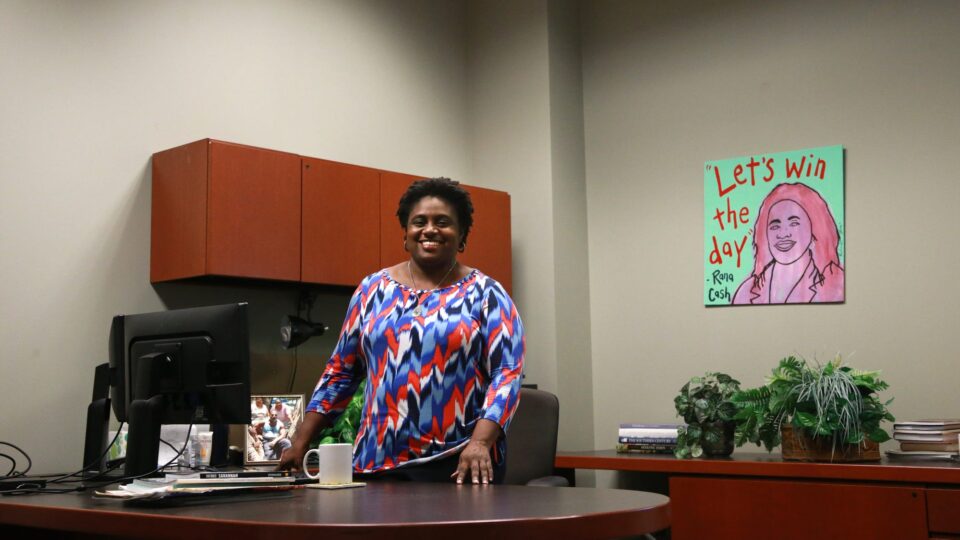‘Won’t Run Away’ From Racial Stories
Lowe Sees ‘Chance of a Lifetime’
‘J. Michael’ Named Orlando Sports Editor
ESPN Removes Nichols From NBA Programming
Oakland Plaque Honors Chauncey Bailey
Balta Named Associate Editor at Chicago Reporter
Accused Denver Station Names Diversity Exec
Neo-Nazi Who Targeted Journalists Gets 3 Years
Brooke Thomas Has the Last Laugh
Public Radio Producer Thurston Briscoe Dies
Lowe Tapped as Dean at FAMU, Cash’s Alma Mater
Rana Cash, executive editor of the Savannah (Ga.) Morning News, was named executive editor of the Charlotte Observer Wednesday, the McClatchy Co. announced, continuing a remarkable string of appointments of Black journalists in top positions since the nation’s racial reckoning in the wake of George Floyd’s murder last year by Minneapolis police.
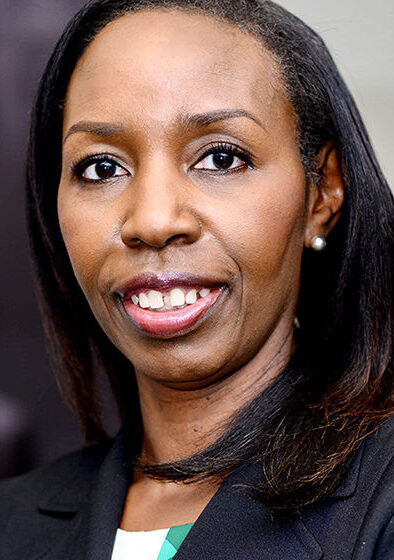 That announcement was quickly followed by the naming of Mira Lowe (pictured), veteran journalist and editor, as dean of the School of Journalism & Graphic Communication at Florida A&M University, Cash’s alma matter. (see next item)
That announcement was quickly followed by the naming of Mira Lowe (pictured), veteran journalist and editor, as dean of the School of Journalism & Graphic Communication at Florida A&M University, Cash’s alma matter. (see next item)
“Cash says her historic role as the Observer’s first Black executive editor carries a significant responsibility — of helping produce relevant and essential journalism for a more diverse audience, both in the daily print newspaper and the Observer’s 24-hour online platform,” Michael Gordon reported for the Observer.
“ ‘As a journalist first, and as a woman of color, I’m sensitive to the topics of equity and inequity, of diversity and inclusion,’ Cash said. ‘Not only in how we cover Charlotte, but in how our newsroom looks like Charlotte. We will not be telling stories about communities of color but for communities of color.'”
McClatchy said in a news release, “Cash, 50, will draw upon three decades of sports and news journalism, including stops at The Miami Herald, The Dallas Morning News, The Atlanta Journal-Constitution, The Minneapolis Star-Tribune and The Louisville Courier Journal.” She starts Oct. 1.
The company also said, “In addition to her exceptional background as both journalist and digital strategist, Cash’s deep advocacy for diversity in newsrooms aligns with McClatchy’s own commitment to building more inclusive teams. Cash’s appointment marks an important milestone in McClatchy’s diversity journey: she is the first Black person to be executive editor of The Observer.”
Last year, McClatchy named Monica R. Richardson as executive editor of The Miami Herald.
Elsewhere, Maria Reeve has become top editor at the Hearst-owned Houston Chronicle, Katrice Hardy leads the newsroom at the Dallas Morning News and Kevin Merida has become editor at the Los Angeles Times. Kim Godwin was named president of ABC News in April, and Rashida Jones was appointed president of MSNBC in December. All are African American.

In addition, the Gannett Co., which owns the Savannah property, committed to having its staffing reflect the diversity of the nation by 2025, prompting further appointments of people of color and increased coverage of communities of color.
“Cash said a racial reckoning has jolted the country,” Gordon reported. “Charlotte, she believes, has not been excluded.
“ ‘We’re not going to run away from those stories,’ she said. ‘It’s a moment in time when as journalists we have a responsibility to cover public safety in a way that holds law enforcement accountable. We know they have tough jobs. But we’ve learned that we need to be more skeptical, more curious, to ask tougher questions and demand that they be answered.
“ ‘We have to show that we care about every citizen in our city. … Sometimes that means we have to be a bigger pain. But if that’s what it takes to keep people safe, that’s what we’ll do.’ “
McClatchy said that In Savannah, “Under her leadership, the Morning News moved from institutional sourcing to community sourcing, created new positions for investigative journalism and reorganized both news and opinion to emphasize local reporting. These initiatives drove a greater than 100% increase in digital subscriptions, with 35% growth within majority Black communities of Savannah.”
Gordon also wrote, “Here’s what Cash says the paper’s readers — and the region’s residents — can expect:
- “A newsroom that will cover its communities from the ‘ground up’ — coupling accountability and solutions-based journalism with stories that crisscross a broader neighborhood map.
- ” ‘All our communities need to be reflected in our coverage, not just people of influence,’ Cash said during a Tuesday phone interview. ‘Everyday people should be able to pick up our paper or come to our website and see themselves, their lives, and the stories that matter to them.’
- ” ‘A newspaper that asks tough questions and digs deep for answers, particularly in matters of public safety and how police and other government officials treat communities of color.”
Maria Ramirez Uribe reported Tuesday for Charlotte’s WFAE, “In Mecklenburg County, Latinos were among the fastest-growing racial and ethnic groups, according to Census Bureau numbers. The number of Latinos grew more than 50% in the last 10 years, while the number of Black residents grew by nearly 20% and white residents by 7%.”
In the News Leaders Association’s 2019 newsroom diversity survey [PDF], the Observer reported 22.41 percent people of color. In a newsroom of 58 salaried employees, 45 were white, eight Black, 3 Hispanic and 2 Asian.
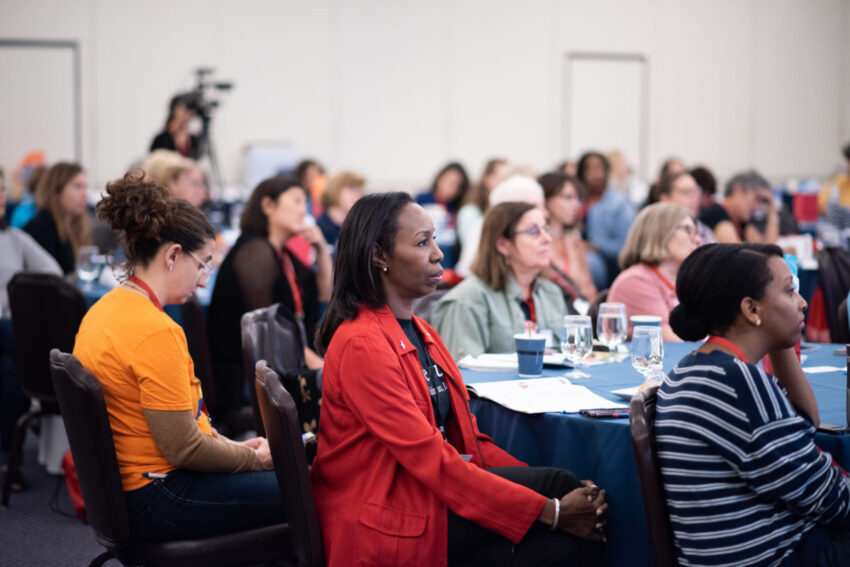
Lowe Sees ‘Chance of a Lifetime’
Mira Lowe, named dean of the School of Journalism & Graphic Communication at Florida A&M University Wednesday, said in the announcement that ‘Being SJGC dean is a chance of a lifetime to help expand its record of achievement and to play a proud part in this HBCU moment.“
FAMU is considered one of the top journalism programs among historically Black colleges and universities, known as HBCUs.
In the Tallahassee Democrat in March, under the headline “Three top newsroom leaders credit Florida A&M University for their success,” reporter Byron Dobson cited Leon Tucker, executive editor of The Ledger in Lakeland, Fla.; Kimberly Godwin, now president of ABC News; Anica Butler, deputy managing editor for local news at The Boston Globe; Caryn Wilson, New York Times weekend audience editor; Cash; and Marlon A. Walker, now executive editor of the Clarion Ledger in Jackson, Miss.
Lowe’s appointment is significant for another reason: She will be the first leader since founding dean Robert Ruggles who did not hold a doctorate. Like the naming of DeWayne Wickham and then Jackie Jones at Morgan State University, FAMU appears to be prioritizing real-world journalism experience over a career primarily in academia.
Lowe is assistant dean for student experiences and director of the Innovation News Center at the University of Florida College of Journalism and Communications. Lowe is also president of the Journalism and Women Symposium (JAWS), a nonprofit organization serving women in journalism.
Lowe was an editor at CNN Digital in Atlanta for five years, editor-in-chief of Jet magazine and worked at Newsday in New York for 18 years.
“She has been director of the CJC Innovation News Center, one of the largest student-powered newsrooms in the country, since 2017,” FAMU said in a news release. “A master’s degree graduate of Columbia University, Lowe has been an adjunct journalism instructor and guest lecturer on digital storytelling, communications and career preparation at several colleges and universities around the country.”
She succeeds Bettye Grable, a professor specializing in public relations, who became acting dean of the school last year after the ouster of Dean Michelle Ferrier in March 2020.
In a separate news release, the University of Florida said, “Lowe joined UFCJC in 2017 as INC Director. Since then, the news program has continuously elevated its journalistic profile with innovative and award-winning content of interest to both local residents and regional partners.
“During her tenure, the College has placed in the top 5 of the Hearst Journalism Awards Intercollegiate Competition four times, first in the Broadcast News competition twice, and UFCJC students have won 65 individual awards. Overall, UFCJC students and news staff have won more than 400 news awards since 2017. . . .
“ ‘Mira Lowe’s entire career has been about journalistic excellence,’ said Hub Brown, UFCJC dean. ‘She brought that excellence to the College of Journalism and Communications, and students and colleagues have truly benefitted. We are better for her having been among us. Now FAMU gains tremendously, and we wish them and Mira the very best.’ ”
Lowe is married to Herbert Lowe, lecturer and Summer Media Institute director at the University of Florida and a former president of the National Association of Black Journalists. He would introduce her then as the “First Lady of NABJ.”
- Caitlin Yoshiko Kandil, NBCU Academy: One campus editor wanted to boost newsroom diversity. Her solution: pay student reporters.
- Rana L. Cash, Savannah Morning News: On matters of race, our newsroom has fallen short. Here’s how we’ll be better for Savannah (Aug. 20, 2020)
- Evelyn Mateos, Editor & Publisher: USA TODAY series shares narratives from diverse communities (Aug. 17)
- Gerry Smith, Bloomberg: Struggling News Industry Steps Up Recruitment of Diverse Leaders
- Gustavo Solis, USC: Making private industries more diverse starts at USC
- Adam Van Brimmer and Rana L. Cash, Savannah Morning News: Community advisory board formed to help news organization discover new ‘institutional voice‘ (April 9)
‘J. Michael’ Named Orlando Sports Editor
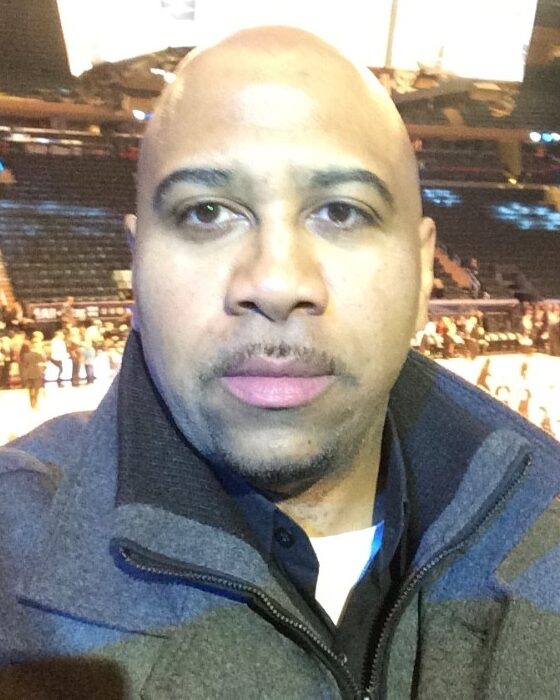 J. Michael Falgoust (pictured), a beat writer at the Indianapolis Star known to many simply as “J. Michael,” is returning to the Orlando Sentinel as one of a handful of African American sports editors at mainstream newspapers.
J. Michael Falgoust (pictured), a beat writer at the Indianapolis Star known to many simply as “J. Michael,” is returning to the Orlando Sentinel as one of a handful of African American sports editors at mainstream newspapers.
Cassie Armstrong, the Sentinel’s features/sports content director, wrote to the staff:
“J. Michael Falgoust has accepted the position of Sports Editor and will be joining us (again) on Aug. 30. Johnnie is coming to us from the Indianapolis Star, where he has been the Indiana Pacers beat writer for the past three years.
“Before Indy, he was the NBA reporter on the Washington Wizards for the NBS Sports Group where he did sideline reporting and produced stories, as well as live pre- and post-game analysis for their digital platform.
“Johnnie also has worked for USA Today as a national NBA reporter and as an assignment editor, where he supervised a team of reporters covering college basketball, USA soccer and high schools. He was also their on-site coordinator during the 2004 Athens Olympics. But before all of that, he worked at the Orlando Sentinel for six years as an assistant sports editor/night news supervisor, managing staff writers in five bureaus and three layout editors. Please join me in welcoming Johnnie back to Orlando!”
Richard Lapchick, who produces racial and gender report cards for the Associated Press Sports Editors through The Institute for Diversity and Ethics in Sports, has consistently found diversity lacking among the leadership of sports departments.
Lapchick wrote in 2018, “The combined grade for 2018 was a D-plus, the lowest of all the reports issued by TIDES. This report shows that 85 percent of the sports editors, 77 percent of the assistant sports editors, 80 percent of the columnists, 82 percent of the reporters and 78 percent of the copy editors/designers were white. The percentages of males in those positions this year are 90, 70, 83, 89, and 80.” He told Journal-isms Thursday that a new report would be issued within a month.
Gregory H. Lee Jr., senior assistant managing editor at The Boston Globe and former president of the National Association of Black Journalists, lists these current Black sports editors: Randy Archibold at the New York Times; Reina Kempt at the Courier Journal in Louisville, Ky.; Kirkland Crawford at the Detroit Free Press; Thomas Scott at the Beaumont (Texas) Enterprise; John Devine at the Miami Herald; Otto Strong at the Fort Worth (Texas) Star-Telegram; Josh Capers at the Clarion Ledger in Jackson, Miss.; and now Falgoust.
Separately, A. Sherrod Blakely, NBA writer for the Bleacher Report who chairs the Sports Task Force of the National Association of Black Journalists, became APSE diversity chair this month at the APSE convention in Las Vegas.
Blakely told Journal-isms this week that he plans to:
- “Strengthen APSE’s diversity pledge which is a great start, but more work needs to be done
- “Increase visibility, awareness and opportunities for women of color in newsroom
- “Create more points of entry/engagement with HBCUs (historically Black colleges and universities.”
Falgoust, who said he has been “hunkered down on Florida’s SunCoast since March 2020 when COVID-19 lockdowns began,” announced his new position Tuesday on Twitter.
“I’m returning to a place where it all began for me,” he wrote, “a looong time ago, when I was an entry-level copy editor during the rise of Shaq and Penny . . . ,” referring to Shaquille O’Neal and Penny Hardaway. “It’s an opportunity I couldn’t pass up because of prior relationships and a chance to manage a great group of reporters.”
Falgoust also wrote, “I won’t be done with following NBA. My takes and video breakdowns will continue when I have the time. It has become a hobby for me to study offenses, defenses and play-call signals.”
- Morehouse College: Morehouse College’s New Journalism in Sports, Culture, and Social Justice Degree Aims to Amplify Black Voices and Representation (Aug. 4)
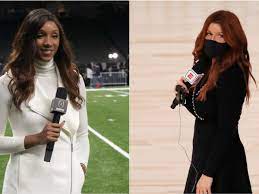
ESPN Removes Nichols From NBA Programming
“ESPN is taking Rachel Nichols off its NBA programming, which includes canceling her daytime show ‘The Jump,‘ Tim Baysinger reported Wednesday for The Wrap.
“ ‘We mutually agreed that this approach regarding our NBA coverage was best for all concerned. Rachel is an excellent reporter, host and journalist, and we thank her for her many contributions to our NBA content,’ David Roberts, senior vice president of production, said in a statement.
“Nichols, who is still under contract with ESPN for another year, has been embroiled in controversy ever since her 2020 comments regarding former ESPN colleague Maria Taylor re-surfaced in a New York Times story in July. In a leaked phone conversation last year, Nichols suggested Taylor was picked over her to cover that year’s NBA Finals because of her race. . ..”
- Andrew Marchand, New York Post: ESPN embarrassed itself during the Rachel Nichols saga
- Andrew Marchand, New York Post: ESPN king Stephen A. Smith had Max Kellerman taken off ‘First Take’
Oakland Plaque Honors Chauncey Bailey
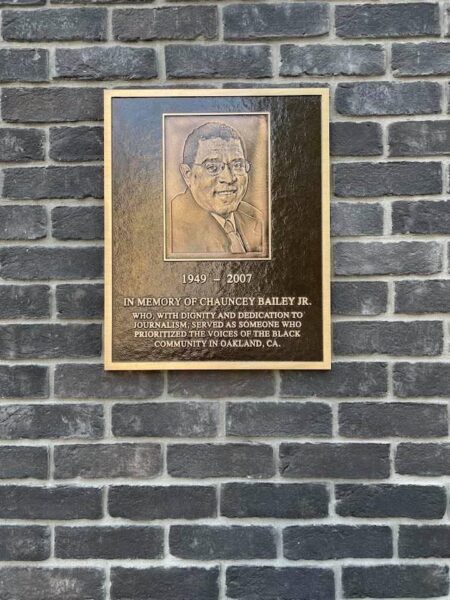
“The plaque, initiated in 2019 by former Oakland, Calif., City Council member Lynette Gibson McElhaney on the 12th anniversary of Chauncey Bailey’s death and erected 14 years after his death, is installed on a building at 14th and Alice streets in Oakland. Bailey was gunned down there on Aug. 2, 2007, to stop his reporting about Oakland’s Your Black Muslim Bakery, whose financial and personnel problems Bailey had been covering. Bailey was walking to work at the Oakland Post, where he was the editor-in-chief, the California-based Post News Group reported Aug. 19.
Balta Named Associate Editor at Chicago Reporter
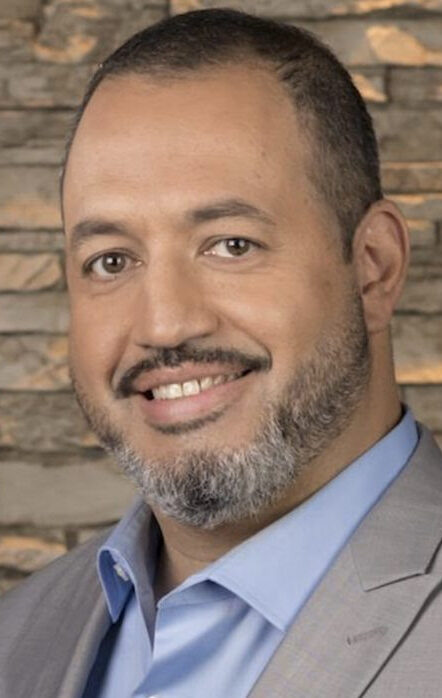 “Hugo Balta (pictured), former news director of Window to the World Communications WTTW-Channel 11, has been named associate editor of The Chicago Reporter (scroll down), founded to undertake investigative reporting, Robert Feder reported Friday on his website on Chicago media
“Hugo Balta (pictured), former news director of Window to the World Communications WTTW-Channel 11, has been named associate editor of The Chicago Reporter (scroll down), founded to undertake investigative reporting, Robert Feder reported Friday on his website on Chicago media
Balta is a two-time president of the National Association of Hispanic Journalists.
“Since February Balta has been a contributing writer to the nonprofit news organization focusing on race and poverty. In his new role Balta will direct day-to-day news coverage and major investigative pieces,” Feder continued.
“ ‘I’m grateful to formally join @ChicagoReporter and contribute to its storied commitment to reporting on race, poverty and social justice,’ he tweeted. Balta, a native of Paterson, New Jersey, and a graduate of Seton Hall University and Columbia Journalism School, continues as owner and publisher of Latino News Network.”
As Feder reported in February, “Balta was forced out . . . as news director of WTTW-Channel 11 and executive producer of ‘Chicago Tonight’ following a staff uprising over his use of social media to express personal views,” a characterization Balta challenged here.
Accused Denver Station Names Diversity Exec
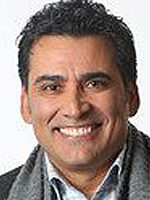 “Tegna NBC affiliate KUSA Denver today appointed Jesse Ogas (pictured) executive director of social responsibility and community affairs, effective Oct. 1,” TVNewser reported Wednesday. “In this newly created position, Ogas will lead community engagement, manage station partnerships and champion inclusivity. He will report to KUSA president-GM Mark Cornetta and be a key part of the station’s executive leadership team.”
“Tegna NBC affiliate KUSA Denver today appointed Jesse Ogas (pictured) executive director of social responsibility and community affairs, effective Oct. 1,” TVNewser reported Wednesday. “In this newly created position, Ogas will lead community engagement, manage station partnerships and champion inclusivity. He will report to KUSA president-GM Mark Cornetta and be a key part of the station’s executive leadership team.”
The leadership of the National Association of Hispanic Journalists met with station leadership in April after a column by former KUSA employee Lori Lizarraga described “a workplace that is hostile against journalists of color.” She said she was the third on-air Latina reporter at the station to be let go in less than a year.
“Ogas will play a strategic role in supporting and championing diversity, equity and inclusion, working with our leaders and teams to build on the inclusive journalism program launched earlier this year,” TVNewser continued. “He will also regularly engage with external community leaders and groups to ensure the work KUSA does reflects its audiences, including underrepresented communities in Colorado. . . .”
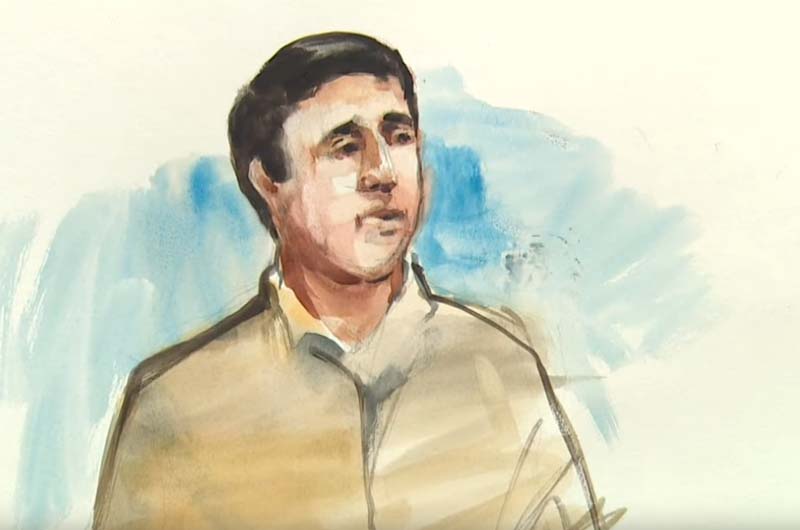
Neo-Nazi Who Targeted Journalists Gets 3 Years
“The leader of a neo-Nazi group accused of targeting and threatening journalists and activists across three states was sentenced to three years in federal prison on Tuesday,“ Perry Vandell reported for the Arizona Republic.
Journalists singled out included Miami Herald columnist Leonard Pitts Jr., ProPublica reporter A.C. Thompson and an unnamed member of the Arizona Association of Black Journalists.
“Cameron Shea, 25, of Redmond, Wash., pleaded guilty in April to one count of conspiring to commit the following offenses:
“Interference with federally protected activities because of religion.
“Mailing threatening communications.
“Cyberstalking.
“Shea was the leader of a neo-Nazi group dubbed the ‘Atomwaffen Division’ . . . .”
The Justice Department said, “Shea and three co-defendants were charged with conspiring via an encrypted online chat group to identify journalists and advocates they wanted to threaten in retaliation for the victims’ work exposing anti-Semitism. The group focused primarily on those who are Jewish or journalists of color.
“The group created posters, which featured Nazi symbols, masked figures with guns and Molotov cocktails and threatening messages, to deliver or mail to the journalists or advocates the group targeted. Shea messaged the group that he wanted Atomwaffen members in different locations to place posters on their victims’ homes on the same night to catch journalists off guard and accomplish a “show of force.” The posters were delivered to victims in Tampa, Seattle and Phoenix.”
“Two of Shea’s co-defendants previously pled guilty to the conspiracy charge and were sentenced. A fourth defendant pled not guilty and is awaiting trial in Sept. 2021,” the Justice Department said.
WELCOME TO THE FAMILY! ??@BrookeOnAir is officially joining the Good Day LA family! pic.twitter.com/NI1lVr63rl
— Good Day LA (@GDLA) August 20, 2021
Brooke Thomas Has the Last Laugh
Brooke Thomas, drummed out of CBS News by then-CBS TV Stations executives Peter Dunn and David Friend, is having the last laugh.
Dunn and Friend were ousted from CBS in April, a few months after both were accused of abusive and racist workplace behavior.
As Meg James reported in January for the Los Angeles Times, Thomas was hired in 2015 at CBS-owned KYW-TV in Philadelphia. But the following day, according to Margaret Cronan, who ran that newsroom, Cronan received an angry call from Friend.
“ ‘It was just immediate screaming on the phone, not constructive criticism — just venom and profanity,’ Cronan said. ‘He screamed: “Tell her to shut the [expletive] up,” in reference to Thomas. ‘I was flabbergasted,’ said Cronan, who kept her notes from that conversation, which The Times has examined. ‘I’ve never witnessed that type of behavior in the workplace.’ ”
“Friend followed up with an email, also reviewed by The Times: ‘Can you please tell her to stop shouting, stop talking in a fake Southern accent and stop sucking the air out of the show,’ Friend wrote. . . .”
Thomas joined KTTV in Los Angeles and on Friday “Good Day LA” announced, as of Thursday, she’ll be the new 4 a.m. anchor.
Public Radio Producer Thurston Briscoe Dies
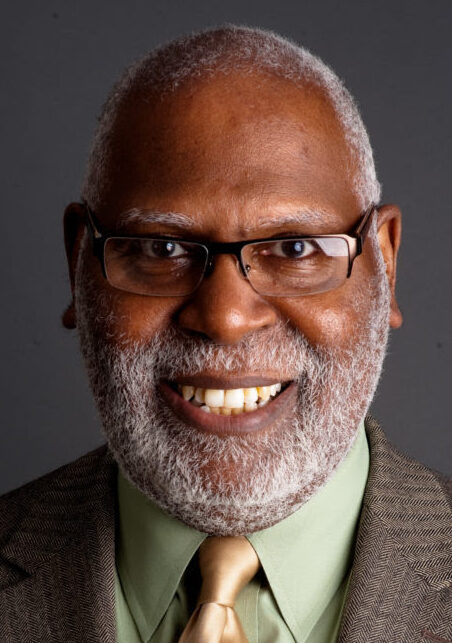 “Thurston Briscoe, a former producer at NPR and PD [program director] at WBGO in Newark, N.J., died Monday,” Tyler Falk reported Aug. 19 for Current. “He was 74.
“Thurston Briscoe, a former producer at NPR and PD [program director] at WBGO in Newark, N.J., died Monday,” Tyler Falk reported Aug. 19 for Current. “He was 74.
“The cause of death was throat cancer, according to a WBGO remembrance. He also had Alzheimer’s disease, according to an obituary.
“Former colleagues remembered Briscoe for his warm, friendly presence and big, welcoming smile. His obituary said that he had a ‘natural friendliness and interest in people’ and ‘mentored many new public radio producers and managers nationwide, including and especially African-American producers.’ . . .”
‘The Man’ Went to Afghanistan
Aug. 23, 2021
Seeing the Conflict Through a Black Lens
Short Take
Homepage photo: Taliban leaders (Credit: Press Trust of India)
Support Journal-isms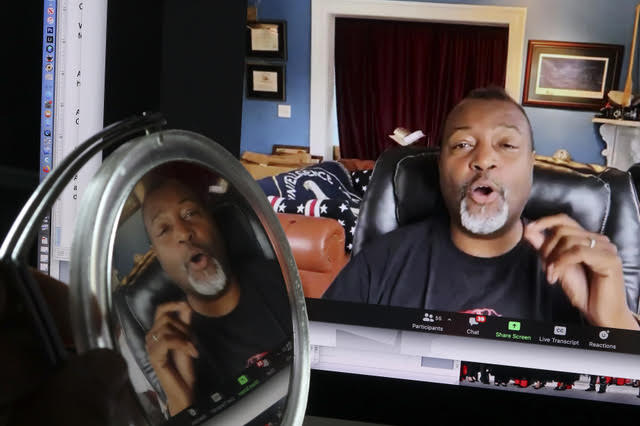
Seeing the Conflict Through a Black Lens
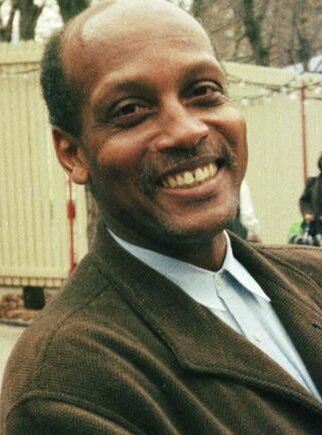 Ozier Muhammad (pictured) was a photojournalist for The New York Times when he went to Afghanistan in 2001 and 2002. “There was a small cadre of my colleagues who had disdain for the Afghan,” he told the Journal-isms Roundtable on Sunday.
Ozier Muhammad (pictured) was a photojournalist for The New York Times when he went to Afghanistan in 2001 and 2002. “There was a small cadre of my colleagues who had disdain for the Afghan,” he told the Journal-isms Roundtable on Sunday.
“Speaking of the interpreters and the support groups, for instance, I heard the word flung around so many times, ‘Rafi, F.U.’ ‘Rafi F,’ ‘Rafi, you’re a dumb M.F.’, to that effect.” Rafi is one of the names of God in Islam.
“And to the Pashtun, the Dari-speaking people . . . the Pashtun people know what that word means, know what it means to say, ‘F.U.,’ or ‘you’re a dumb M.F.,’+ or something like that.”
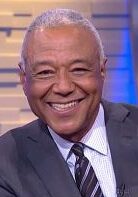 Ron Claiborne (pictured), now retired from ABC News, added, speaking of African American journalists, “I think . . . when we cover a situation like this, the U.S. occupying and imposing itself on a foreign country, if there’s any value in having a different perspective, it is that we tend to be able to see it through the lens of ‘The Man,’ ‘The Man’ imposing his will on people who really don’t want them there, and not understanding the culture and history of a place. I certainly — that was my sense of it when I was there, up in the north in late 2001.”
Ron Claiborne (pictured), now retired from ABC News, added, speaking of African American journalists, “I think . . . when we cover a situation like this, the U.S. occupying and imposing itself on a foreign country, if there’s any value in having a different perspective, it is that we tend to be able to see it through the lens of ‘The Man,’ ‘The Man’ imposing his will on people who really don’t want them there, and not understanding the culture and history of a place. I certainly — that was my sense of it when I was there, up in the north in late 2001.”
Malcolm Nance, the former counterintelligence agent who is now an author and chief terrorism analyst for MSNBC, was blunt. The Afghanistan situation is “literally like Vietnam, white people dropping into the middle of that world with no respect,” in contrast to relationships forged by Al Qaeda.
“I’ve said this on air just recently, we have a bigoted, racist attitude toward the world, and I’m saying this as a professional intelligence officer,” Nance told the group. “This is not me, Malcolm Nance, the African American, saying this. You know, if I was a white guy I’d have to say this . . . we’re a bigoted, self-centered culture.”
Nance also said that “most of those people at the gate, who did not work for the United States, are likely economic refugees. They just see a chance to get out on a free plane, out of Afghanistan,” and that because it is a patriarchal society, Western-style women’s rights might not be the priority depicted in the West.
As many as 78 were on the Zoom Journal-isms Roundtable call and 137 more watched on Facebook Live. [Facebook users can watch at < when they were paying attention at all — had been reporting over the last 20 years.
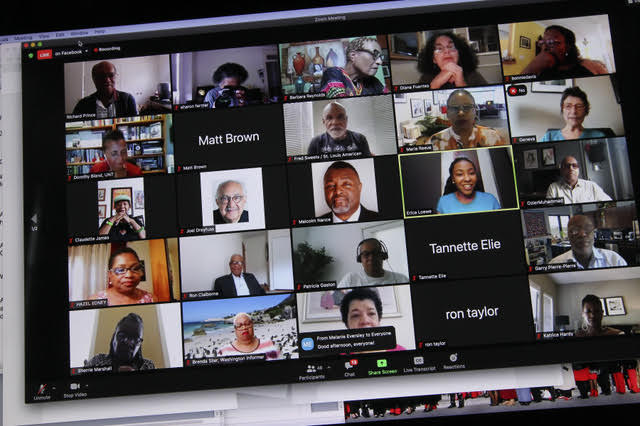
In the middle of the Roundtable, Geneva Overholser, veteran journalist, editor and professor, wrote in the chat room, “Why does it take so long for truth to catch up? That persistent question makes you feel pretty miserable about journalism.”
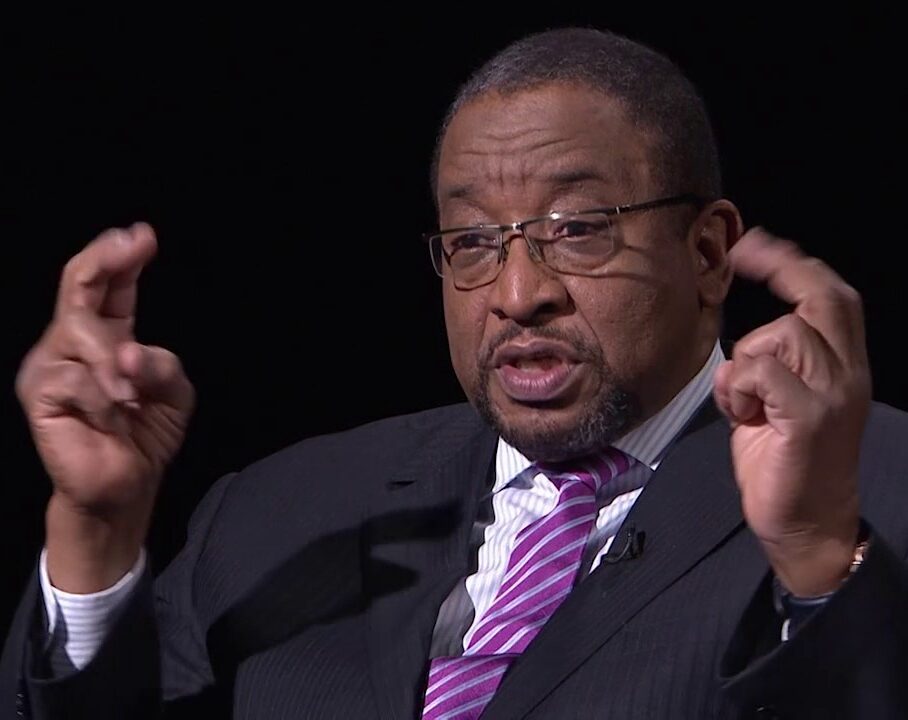 Randall Pinkston (pictured) replied, “Geneva, I think one answer to your question is the people who decide what will be covered move from crisis to crisis… rather than focusing on the history and tribal relationships of the nation… and, of course, the government that controls the sending of our taxpayer dollars is not going to reveal the tons of taxpayer dollars going to American contractors and the Afghans the US chose to pay.”
Randall Pinkston (pictured) replied, “Geneva, I think one answer to your question is the people who decide what will be covered move from crisis to crisis… rather than focusing on the history and tribal relationships of the nation… and, of course, the government that controls the sending of our taxpayer dollars is not going to reveal the tons of taxpayer dollars going to American contractors and the Afghans the US chose to pay.”
As a CBS News correspondent, Pinkston was among about 200 Western journalists who traveled from Peshawar, Pakistan, across the Torkham border into Jalalabad, Afghanistan, in October 2001. Pinkston was also in Tora Bora, the mountainous region where Osama Bin Laden was believed to have hidden.
When President Biden spoke to the nation an hour after the Roundtable, it was as if he and those reporting on the developments were in a parallel universe. Their emphasis contrasted sharply with our panelists’.
The journalists also heard from Maria Reeve and Katrice Hardy, Black women who are the new top editors of the Houston Chronicle and Dallas Morning News, respectively, and from Trey Baker, Biden’s senior adviser for African American outreach/public engagement. Baker outlined Biden initiatives of special interest to African Americans, filling in for Karine Jean-Pierre, deputy White House press secretary, who was called away in preparation for Biden’s speech.
Reeve and Hardy accepted the congratulations and support of Black journalists, particularly women, and discussed how they planned to lead their newsrooms in our changing media environment.
“Just think, when I came into journalism in the 1960’s, having Maria and Katrice heading these news operations were beyond the wildest dreams” of most of us, Barbara Reynolds said in a common sentiment.
Sherrie Marshall, retired executive editor of the Telegraph in Macon, Ga., said she hoped that the two women never allow themselves to fall victim to the “impostor syndrome,” a topic at last week’s conference of the National Association of Black Journalists. It is defined as “the persistent inability to believe that one’s success is deserved or has been legitimately achieved as a result of one’s own efforts or skills.”
Nance said Biden should fire Jake Sullivan, the national security adviser, for his lack of planning, and replace him with retired Lt. Gen. Russel Honoré. Honoré is best known for his role as commander of the task force that was in charge of the U.S. military response to Hurricane Katrina in 2005. He is now leading a review of the U.S. Capitol’s security in the wake of the deadly Jan. 6 attack.
The mishandling of the wars in Afghanistan and Iraq, fueled by arrogance, wasteful spending and ignorance of local cultures, predates Sullivan and goes back to the George W. Bush administration, Nance said. He gave this example:
“When we left Afghanistan and started the invasion, . . . started planning in February 2002. That’s when I got my first contract with Naval Special Warfare and Special Operations Command to start operational planning for an invasion of Iraq, one year before we invaded” in March 2003.
“I was making $10,000 per class every 72 hours to train [Navy] SEALs and special boat squadron people in prisoner handling and Arabic. Right. All for Iraq, Iraqi dialect . . .
“And in the runup to the invasion of Iraq, I was making so much money I felt guilty. And I . . . sent a letter to the secretary of the Navy and the master chief petty officer in the Navy and I said, ‘Look, you’re about to invade the middle of the Middle East, right, Mesopotamia; you need every person that can speak Arabic. I would request respectfully to be brought back on active duty because I’m charging you a boatload of money to do something I could do for free and help you in this invasion.’
“I have a letter which I’m going to frame someday that will be in my memoirs, from the secretary of the Navy, that says, ‘We have no foreseeable requirement for people who speak Arabic.’
“I mean, we’re about to invade a country of 40 million Arabs, and he did not want anyone else who could speak Arabic because he thought like [then-Vice President] Dick Cheney said,” once we liberate the Iraqis they will “join us, and we’ll have all the interpreters we need.
“Why did we have interpreters in Afghanistan and Iraq? Because they would not teach the soldiers, or often the State Department personnel . . . who were rotating through by the thousands in Afghanistan. Even CIA officers weren’t fluent in Dari or Farsi or Pashto or, you know, any other dialects. Oh, they’re not even [learning] Punjabi, right, which is [spoken in] Pakistan, to listen to the ISI,” the Pakistan intelligence services. “None of that.
“We think we’re going to get these people; we wouldn’t have to fly out 15,000 translators. If our Special Forces groups were all trained in Farsi or Dari or Pashto . . . we can feel the culture better.
“We don’t do that, [we’re] the United States of America. Everybody wants to drink Coke, everybody wants to immigrate to the United States.”
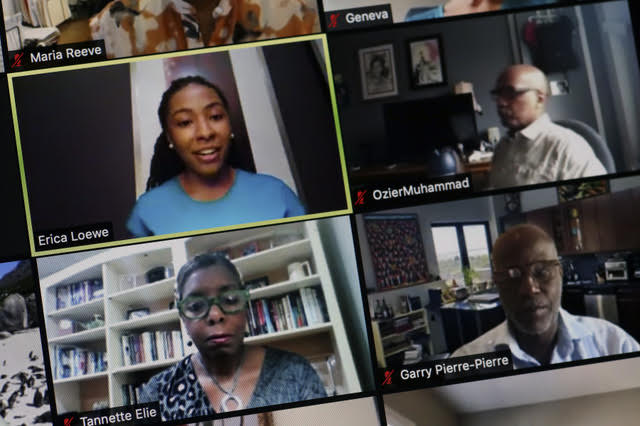
Wrong. As for Afghan soldiers not willing to fight, Nance continued, ‘What I’ve learned — this key point — is they don’t betray us. They make choices within their culture that . . . satisfy them culturally, religiously and benefit their family.” Nance recounted how as a spy he presented himself as a Muslim and sipped tea with an imam in Tora Bora.
“Everything we’ve done, had done there should have been with people who were Muslim Americans or people, you know, local people who were incorruptible. Money takes everything down there, even though — here’s a good example. Even though I was there at the direction of their warlord to get through the checkpoint to Tora Bora, I had to bribe the effing guards with $500 cash. Right.
“And I’m like, they had been so used to being handed handfuls of cash from Fifth Group Special Forces,
that, you know, the U.S. government still gotta pay to go into the village we just bombed. I mean, they saw Afghanistan, on the tribal level, as a money-making opportunity. . . . if you’re a Westerner, you’ll never understand it for your entire life. . . .
“It is a patriarchal, misogynistic, fundamentalist Islamic Society . . . there are religious groups in the United States that are exactly the same. Mormons, right, you know those Mormon cults out west.
“You cannot change that.”
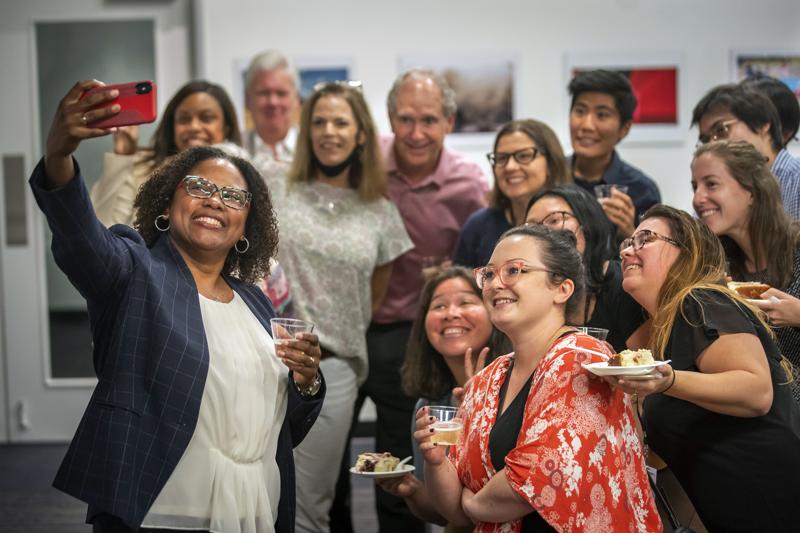
When the subject shifted to the new Texas editors, Reeve, who was managing editor at the Houston Chronicle before her promotion in July, responded to a question about Texas’ status in the news as a locus of anti-vaccine sentiment and a battleground over voter suppression.
“You know, Texas is wild,” Reeve said. “In our news meeting Thursday, that morning I said, ‘Okay, we’ll see what today brings, they told me to stop saying that because that was the night where Dan Patrick,” the lieutenant governor, “went on Fox and said what he said about Black folks driving our numbers here” on COVID infections.
“We also had a Texas Supreme Court ruling that day. It is nonstop, which I like.”
Reeve also said her priority is growing her digital audience and changing a culture in which even younger reporters seek to write “50 inch stories that no one — like no one” is reading.
Hardy, who arrived at the Morning News the week prior from the Indianapolis Star, said she asked all staffers eight questions, to help her determine how the news operation can better use its resources. She has already ended one news meeting that she considered unnecessary. Hardy praised Gannett, where she worked for five years, saying, “There is no more digitally savvy news organization or company. . . . They get it, they understand the audience they’ve invested in in audience research, and that has been a phenomenal . . . learning ground for me.”
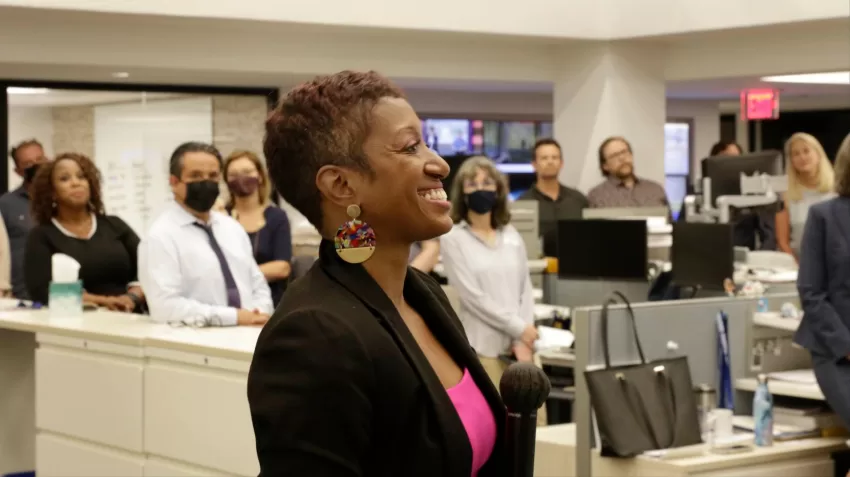
Hardy is chair of the News Leaders Association. She said that Gannett has provided a playbook. “It was all about transformation, not so much digitally, but on the choices we make to serve our audience and who we were neglecting.”
She also noted the need for better branding of Dallas Morning News product that young people read on social media, and for meeting them on the newer social media platforms. “Civic engagement is a huge issue for many young people when it comes to the environment, when it comes to voting rights. Even when it comes to, frankly, issues around just diversity, because their friends represent so many different segments of the population.”
Erica Loewe, White House director of African American media, was asked whether even having such a position amounted to “segregation.” She replied that “I’d like to believe that I’m here just to make sure that there’s access and that everyone has a seat at the table.”
Peggy Lewis, who held a similar post during the Clinton administration, commended Loewe and Baker because “it is a tough position . . . I was trying to make sure Native Americans (were) at the table, that Hispanic reporters were at the table, so it’s a fight that we continue to see.”
- Jon Allsop, Columbia Journalism Review: Biden, Trump, and the missing big picture in Afghanistan coverage
- Emma Ashford, Washington Post: Buried doubts and public deceptions in the Afghan war (Review of “The Afghanistan Papers: Secret History of the War” by Craig Whitlock)
- Alexis Benveniste, CNN: Western news outlets are working to evacuate local journalists from Afghanistan
- William Brangham with Sarah Chayes, PBS Newshour: The U.S. ignored corruption within the Afghan government. Did that lead to its fall? (video)
- Sarah Chayes, sarahchayes.com: The Ides of August (Aug. 16)
- Committee to Protect Journalists: G-7 must protect and evacuate journalists and media workers in Afghanistan
- Dexter Filkins, New Yorker: What We Left Behind in Afghanistan
- Stephen Grey, Charlotte Greenfield, Devjyot Ghosal, Alasdair Pal and Reade Levinson, Reuters: Reuters photographer was killed after being left behind in retreat, Afghan general says
- Bruce Haring, Deadline: Fox News Rescues Afghan Nationals Who Aided Correspondents
- Julie Hollar, Fairness & Accuracy In Reporting: Media Rediscover Afghan Women Only When US Leaves
- Journal-isms: Journalists Say They Foresaw Tragic Outcome
- Lucas Kunce, Kansas City Star: I served in Afghanistan as a US Marine, twice. Here’s the truth in two sentences
- Paul Mozur and Zia ur-Rehman, New York Times: How the Taliban Turned Social Media Into a Tool for Control
- Press Trust of India: The Taliban: what could its return to power mean for Afghanistan? (July 27)
- Abubakar Siddique, Radio Free Europe/Radio Liberty: The Taliban’s Quest For Legitimacy Faces Mounting Obstacles
- Alice Speri, The Intercept: U.S. Media Organizations Scramble to Get Hundreds of Afghan Colleagues to Safety
- Charlotte Tobitt, Press Gazette, Britain: Some 200 Afghan journalists given right to settle in UK following appeal from media outlets
- Natasha Turak, Abigail Ng and Amanda Macias, CNBC: ‘Intelligence failure of the highest order’ — How Afghanistan fell to the Taliban so quickly
Short Take
- Journal-isms is renewing its search for an assistant editor to work part time, 15 to 20 hours weekly. Please see the “About” section of this website for more information.
To subscribe at no cost, please send an email to journal-isms+subscribe@groups.io and say who you are.
Facebook users: “Like” “Richard Prince’s Journal-isms” on Facebook.
Follow Richard Prince on Twitter @princeeditor
Richard Prince’s Journal-isms originates from Washington. It began in print before most of us knew what the internet was, and it would like to be referred to as a “column.” Any views expressed in the column are those of the person or organization quoted and not those of any other entity. Send tips, comments and concerns to Richard Prince at journal-isms+owner@
View previous columns (after Feb. 13, 2016).
View previous columns (before Feb. 13, 2016)
- Diversity’s Greatest Hits, 2018 (Jan. 4, 2019)
- Book Notes: Is Taking a Knee Really All That? (Dec. 20, 2018)
- Book Notes: Challenging ’45’ and Proudly Telling the Story (Dec. 18, 2018)
- Book Notes: Get Down With the Legends! (Dec. 11, 2018)
- Journalist Richard Prince w/Joe Madison (Sirius XM, April 18, 2018) (podcast)
- Richard Prince (journalist) (Wikipedia entry)
- February 2018 Podcast: Richard “Dick” Prince on the need for newsroom diversity (Gabriel Greschler, Student Press Law Center, Feb. 26, 2018)
- Diversity’s Greatest Hits, 2017 — Where Will They Take Us in the Year Ahead?
- Book Notes: Best Sellers, Uncovered Treasures, Overlooked History (Dec. 19, 2017)
- An advocate for diversity in the media is still pressing for representation, (Courtland Milloy, Washington Post, Nov. 28, 2017)
- Morgan Global Journalism Review: Journal-isms Journeys On (Aug. 31, 2017)
- Diversity’s Greatest Hits, 2016
- Book Notes: 16 Writers Dish About ‘Chelle,’ the First Lady
- Book Notes: From Coretta to Barack, and in Search of the Godfather
- Journal-isms’ Richard Prince Wants Your Ideas (FishbowlDC, Feb. 26, 2016)
- “JOURNAL-ISMS” IS LATEST TO BEAR BRUNT OF INDUSTRY’S ECONOMIC WOES (Feb. 19, 2016)
- Richard Prince with Charlayne Hunter-Gault,“PBS NewsHour,” “What stagnant diversity means for America’s newsrooms” (Dec. 15, 2015)
- Book Notes: Journalists Follow Their Passions
- Book Notes: Journalists Who Rocked Their World
- Book Notes: Hands Up! Read This!
- Book Notes: New Cosby Bio Looks Like a Best-Seller
- Journo-diversity advocate turns attention to Ezra Klein project (Erik Wemple, Washington Post, March 5, 2014)
When you shop @AmazonSmile, Amazon will make a donation to Journal-Isms Inc. https://t.co/OFkE3Gu0eK
— Richard Prince (@princeeditor) March 16, 2018

